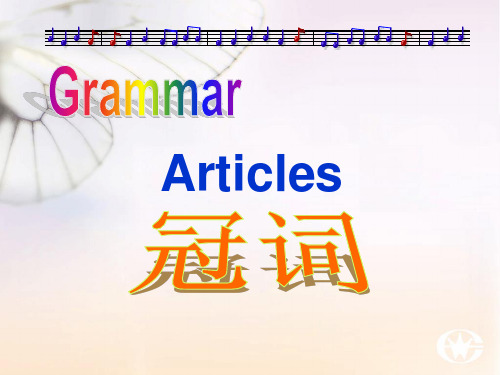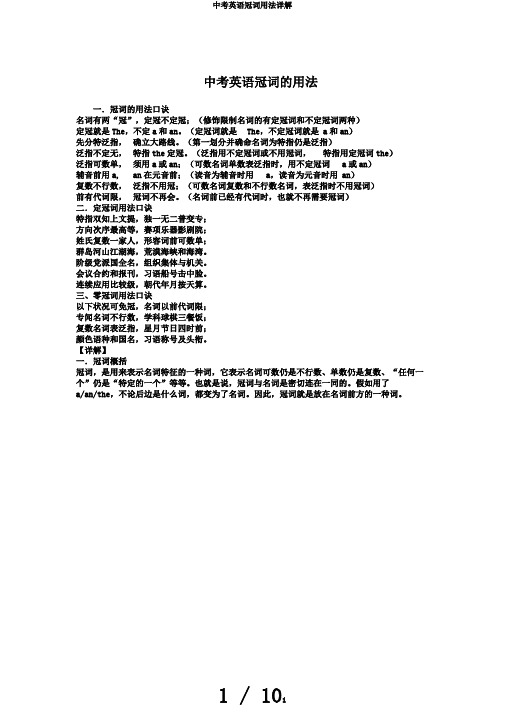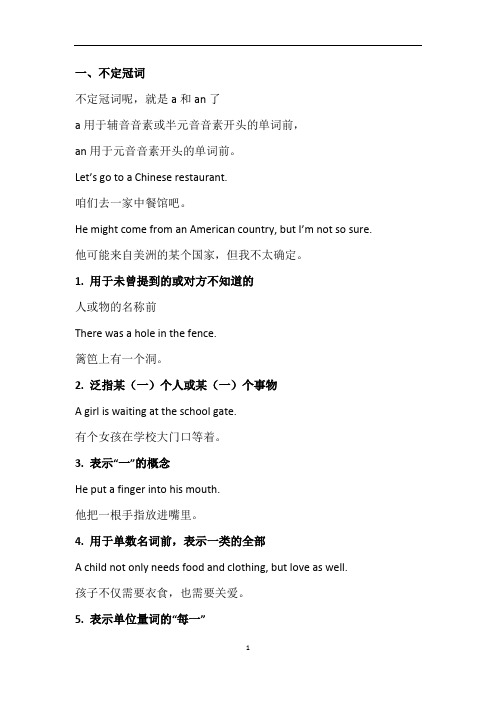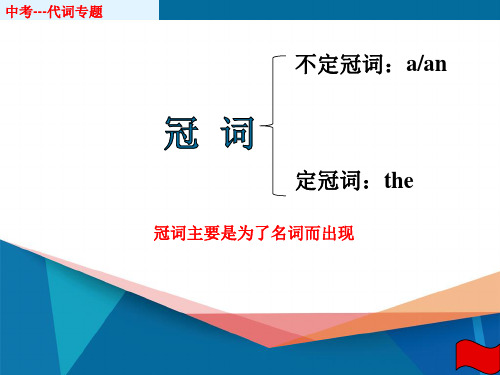中考英语复习:冠词a.an.the.的用法
- 格式:docx
- 大小:16.53 KB
- 文档页数:15

中考英语冠词讲解与考点分析冠词是中考单项填空必考的语法项目之一,一般每年有一道小题,两个空。
因为冠词用法比较灵活,往往随着语境的变化而变化,并且固定搭配和特例较多,失分的考生比较多。
本文将结合中考试题,归纳冠词的考点。
第一部分:基础知识一、冠词概述冠词是虚词,它不能单独使用。
只能附在一个名词上说明这个名词。
冠词分为不定冠a(an)词和定冠词the。
不定冠词一般表示泛指;定冠词一般表示特指。
二、不定冠词a(an)的用法A. 不定冠词a(an)用于单数可数名词前。
a用于辅音字母开始的词前;an用于元音字母开始的词前。
如:a girl an English bookB. 不定冠词用来表示类别,指某一类人或某一类事物中的一个(泛指)。
如:His father is a doctor.I work in a middle school in Beijing.C. 不定冠词用于单数可数名词前,可以表示其全类(泛指)。
如:An English teacher teaches the students how to learn English.三、定冠词the的用法①表示上文提到过的人或事物。
如:He bought an English-Chinese dictionary this morning.The dictionary is very good.②用于单数可数名词前,表示整体或类别。
如:The panda is a rare animal.此句等于:A panda is a rare animal. = Pandas are rare animals.③用来表示世界上独一无二的事物。
如:the sun, the moon, the sky, the earth, the world④用于表示阶级、党派的名词前。
如:the Chinese Communist Party, the working class the proletariat 无产阶级⑤常用于含有普通名词或形容词的专有名词前。


中考英语冠词用法在中考英语中,冠词的用法主要包括不定冠词( a/an )和定冠词( the )。
1. 不定冠词( a/an )a. 不定冠词用于泛指单数可数名词前。
例如:- I saw a dog in the park.- She wants to buy a new bike.b. 不定冠词用于以元音音素开头的单数可数名词前。
例如:- She is an English teacher.2. 定冠词( the )a. 定冠词用于特定的人或事物前。
例如:- I saw the girl you were talking about.- Can you pass me the pen, please?b. 定冠词用于复数名词前。
例如:- The books on the shelf are all mine.- The students are listening to the teacher.c. 定冠词用于泛指独一无二的事物前。
例如:- The sun rises in the east and sets in the west.- The moon is shining brightly tonight.d. 定冠词用于表示普通事物的专用名称前。
例如:- I go to the cinema every week.- She wants to play the piano.e. 定冠词用于序数词前。
例如:- He came in the first place in the race.- The second floor is where my apartment is.以上是中考英语中冠词的用法总结,希望能对你有所帮助。

初中英语冠词复习教案初中英语冠词复习教案一中考对冠词的考查主要为:不定冠词a和an的用法,定冠词the的用法,零冠词的用法,习惯用语中冠词的位置及使用。
Ⅰ.冠词的定义冠词是虚词。
通常放在名词之前,用来说明名词所表示的人或事物。
冠词分为不定冠词(a和an)和定冠词(the)两类。
Ⅱ.冠词的用法1.不定冠词a, an的用法(1)泛指某人或某物,但不具体说明何人或何物。
A girl is waiting for you.(2) 不定冠词a 用在以辅音音素开头的单数可数名词前;a useful book; a desk;不定冠词an 用在以元音音素开头的单数可数名词前。
如: an old man; an actor; an “m” 。
(3) 第一次提到某人或某物而非特指时。
如:There is a book on the desk, but the book isn’t mine.(4) 表示人或事物的某一类。
如:An elephant is bigger than a tiger.(5) 用于表时间、速度、价格等意义的名词之前,有“ 每一” 的意思,相当every 如: three times a week.(6) 表示数量,有“一”的意思,但数的概念没有one强烈。
I have a computer.(7)用在序数词前,表示“又一,再一”I have three books. I want to buya fourth one.(8)可视为一个整体的两个名词前 eg: a knife and fork 一副刀叉(9)用在某些固定词组中:如:have a good time; have a swim ,have acold , half an hour ,a lot(of), after a while , in a hurry , for a long time, a few ,a little ,at a time ,2.定冠词the的用法(1)用来特指某人或某物,双方都知道的人或物的名词前如:Open the door, please.(2) 用于上文提到的某人或某物。


中考英语冠词的用法一.冠词的用法口诀名词有两“冠”,定冠不定冠;(修饰限制名词的有定冠词和不定冠词两种)定冠就是The,不定a和an。
(定冠词就是The,不定冠词就是 a和an)先分特泛指,确立大路线。
(第一划分并确命名词为特指仍是泛指)泛指不定无,特指the定冠。
(泛指用不定冠词或不用冠词,特指用定冠词the)泛指可数单,须用a或an;(可数名词单数表泛指时,用不定冠词a或an)辅音前用a, an在元音前;(读音为辅音时用a,读音为元音时用 an)复数不行数,泛指不用冠;(可数名词复数和不行数名词,表泛指时不用冠词)前有代词限,冠词不再会。
(名词前已经有代词时,也就不再需要冠词)二.定冠词用法口诀特指双知上文提,独一无二普变专;方向次序最高等,赛项乐器影剧院;姓氏复数一家人,形容词前可数单;群岛河山江湖海,荒漠海峡和海湾。
阶级党派国全名,组织集体与机关。
会议合约和报刊,习语船号击中脸。
连续应用比较级,朝代年月按天算。
三、零冠词用法口诀以下状况可免冠,名词以前代词限;专闻名词不行数,学科球棋三餐饭;复数名词表泛指,星月节日四时前;颜色语种和国名,习语称号及头衔。
【详解】一.冠词概括冠词,是用来表示名词特征的一种词,它表示名词可数仍是不行数、单数仍是复数、“任何一个”仍是“特定的一个”等等。
也就是说,冠词与名词是密切连在一同的。
假如用了a/an/the,不论后边是什么词,都变为了名词。
因此,冠词就是放在名词前方的一种词。
冠词分为不定冠词a/an和定冠词the,在详细使用时可分为用不定冠词、定冠词和不用冠词三种状况。
它的基本用法我们能够用以下口诀来记忆:泛指用a/an,单数可数;特指用the,不特不the。
[注](1)泛指用a/an,单数可数——泛指的单数可数名词前要用a/an。
(2)特指用the——假如是特指,那么不论是可数名词单数、复数或不行数名词前均要用the。
3)不特不the——不特指则不用the,包含泛指的可数名词单数前用a/an,泛指的可数名词复数前不用冠词,泛指的不行数名词前也不用冠词三种状况。

冠词在初中英语阅读理解中的应用技巧
冠词在英语中是非常重要的语法部分,也是初中英语阅读理解
考试中常考的知识点。
以下是一些应用技巧:
一般规则
- 通常情况下,我们使用不定冠词"a/an"来表示单数可数名词,
并且在使用单数可数名词的情况下必须使用冠词。
- 定冠词"the"表示特定的人、物或事物。
通常,我们在第一次
提到某个名词时使用冠词“a/an”,在之后的提到时则可以使用“the”。
- 不使用冠词的情况:泛指、某些专有名词、不可数名词等。
具体应用
- 使用不定冠词"a/an"来表示数量不明确或表示一类事物。
例如,a pen(一支笔)、an apple(一个苹果)。
- 在表示职业、国籍和宗教的形容词前一般不使用冠词。
例如,She is a Chinese teacher.(她是一名中国教师。
)
- 在表示某一餐具名称之前一般不使用"A"。
例如,可以直接说“I want to use chopsticks.”(我想用筷子。
)
- 在表示学科名称的时候不用冠词。
例如,He is good at math.(他擅长数学。
)
这些技巧是初中英语阅读理解考试中的常见规则,掌握这些规则可以提高阅读理解的正确率。


中考英语《固定短语》考点:a、an与the的用法C. I am eating an apple pie. The apple pie is still hot.搞不清楚定冠词the 应该用在“那一个”“这一个”特别指定的目标物前面通常第一次提到一样东西或一个人的时候,我们是在介绍全新或者是听者不知道的人事物,因此不需要特别指定只要用不定冠词a/an 就可以了。
但是当我们在后来的叙述或谈话中再次提到“那”一样东西或“某”个人的时候,就要用到定冠词the 来表示先前已经提过的单数名词。
4、一些不用冠词的情况:(1) 专有名词和(第一次使用)一些不可数名词时前面通常不用。
如:China is a very large country.(中国是个大国) / Man needs air and water.(人类需要空气和水)(2) 名词前已有指示、物主或不定代词作定语时不用。
如:My pen is much more expensive than yours.(我的钢笔比你的昂贵多了)(1)周名,月名或季节名前一般不用。
如:He was born on Monday, February 18,1995.(他出生在1995年二月十八日,星期一)/ They usually plant trees on the hills in spring.(春天他们通常在山上植树)(4) (第一次使用)复数名词表示人或事物的类别时不用。
如:Men are cleverer than monkeys.(人比猴子聪明)(5)三餐饭前不用。
如:We have breakfast at home and lunch at school.(我们在家吃早饭,在校吃午饭)(6)节、假日前一般不用。
如:On Children’s Day the boys often get presents from their parents.(在儿童节,这些男孩经常得到父母的礼物)(7)球类名词前不用。

中考英语语法指南关于冠词用法
冠词需要掌握——
1。
不定冠词a和an。
a用在发音以辅音开头的名词之前,而an则用在发音以元音开头的名词之前。
如:a student,an orange。
不定冠词指表示某一类人或某事物中的任何一个,第一次提到某人或某物时,表示人或事物的某一种类,表示“每一”。
2。
定冠词the的用法:
1)定冠词特指某(些)人或某(些)事物,以区别于同类中其他的人或事物;
2)指上文中已提到过的人或事物;
3)表示世界上独一无二的事物;
4)用在方位名词之前;
5)定冠词与单数名词连用时,表示这一类人或物;
6)定冠词与某些形容词连用时,使形容词名词化,表示某一类人;
7)定冠词还用在序数词、形容词最高级前;
8)用在演奏乐器的名称前;
9)用在姓名复数之前,表示一家人。
3。
不用冠词的情况:
球类运动、三餐、四季、月份、星期、学科前;某些专有名词前,如:Teachers' Day;不特指的不可数名词和可数名词的复数前;还有一些固定短语也不用冠词,需要背记和积累。

语法选择常考考点:一、冠词a, an, the的用法:(具体复习课本131页的内容)1.a:European , university, useful book2.an:hour, American, English teacher , African, Asian, Australian, aunt, uncle, office, email, elephant, animal, actor, earthquake, important subject, art class, interesting book,eight-year-old boy, orange pen, old man, expensive book, egg3.The:西洋乐器前,世上独一无二的事物前,特指某样东西时。
play the piano/in the sun/The girl under the tree is beautiful.二、形容词,副词,比较级,最高级1 .形容词放名词前,修饰名词,副词放动词后,修饰动词。
如:good boy/eat well2,become/get +adj.变得怎么样keep +adj.保持怎么样make sb./sth. + adj.让某人/物怎么样3.形容词放在不定代词、疑问词后,something interesting What else?enough --形前名后big enough enough money4.as/so +形容词原级+ as… 和…一样。
5.用比较级的情况:①A+be动词+形容词比较级+than+B,表示“A比B更”②Which is +比较级,…or…表示两者之间“哪个更……”③“the+比较级+主语+谓语,the+比较级+主语+谓语”表示“越……,就越……如The older she gets, the more she knows.她年纪越大,知道得越多。

一、不定冠词不定冠词呢,就是a和an了a用于辅音音素或半元音音素开头的单词前,an用于元音音素开头的单词前。
Let’s go to a Chinese restaurant.咱们去一家中餐馆吧。
He might come from an American country, but I’m not so sure.他可能来自美洲的某个国家,但我不太确定。
1. 用于未曾提到的或对方不知道的人或物的名称前There was a hole in the fence.篱笆上有一个洞。
2. 泛指某(一)个人或某(一)个事物A girl is waiting at the school gate.有个女孩在学校大门口等着。
3. 表示“一”的概念He put a finger into his mouth.他把一根手指放进嘴里。
4. 用于单数名词前,表示一类的全部A child not only needs food and clothing, but love as well.孩子不仅需要衣食,也需要关爱。
5. 表示单位量词的“每一”He got paid once a month,but not much.他每月领一次工资,但数目不多。
6. 用于某些专有名词前A Mr White wants to see you this afternoon.一位怀特先生今天下午想见你。
7. 用于作可数名词用的抽象名词前Working with Jane is a great joy.和简一起工作是一件很快乐的事。
8. 用于表示“一……”之意的物质名词前I’d prefer a coffee and a chicken sandwich.我要一杯咖啡和一个鸡肉三明治。
9. 用于表示特定的日、月、季节等的名词前表示具体意义I can’t remember a Christmas like it.我的记忆中不曾有过像这样的圣诞节。

中考英语必考词汇考点集锦一、冠词(a, an, the)1. a和an的区别。
- 发音:a [ə; eɪ],an [ən; æn]。
- 词性:都是不定冠词。
- 考点:- 当单词以辅音音素开头时用a,例如:a book [bʊk](book中b发[b],是辅音音素)。
- 当单词以元音音素开头时用an,例如:an apple [ˈæpl](apple中a发[æ],是元音音素)。
2. the的用法。
- 发音:the [ðə; ðiː]。
- 词性:定冠词。
- 考点:- 表示特指,例如:The book on the desk is mine.(特指桌子上的那本书)。
- 用于序数词、形容词最高级前,如:the first day,the tallest boy。
二、名词(noun)1. 可数名词复数形式。
- 发音:不同的复数形式有不同的发音规则。
- 词性:名词。
- 考点:- 一般情况加 -s,读音:清辅音后读[s],如books [bʊks];浊辅音和元音后读[z],如dogs [dɒgz]。
- 以s, x, ch, sh结尾加 -es,读[ɪz],如boxes [ˈbɒksɪz]。
- 以辅音字母 + y结尾,变y为i加 -es,读[z],如babies [ˈbeɪbɪz]。
- 以f或fe结尾,变f或fe为v加 -es,如leaves [liːvz](leaf的复数)。
2. 不可数名词。
- 发音:根据单词本身而定。
- 词性:名词。
- 考点:- 不可数名词没有复数形式,如water [ˈwɔːtə(r)],不能说waters。
- 表示数量时,用量词,如a glass of water。
三、代词(pronoun)1. 人称代词主格和宾格。
- 发音:- I [aɪ](主格),me [miː](宾格)。
- he [hiː](主格),him [hɪm](宾格)。
- she [ʃiː](主格),her [hɜː(r)](宾格,同时her也是形容词性物主代词)。


英语语法《冠词的易混用法》知识点
以下是《冠词的易混用法》的知识点:
1. 定冠词 "the":用于特指人或物,是唯一的或已被提及的人或物。
例如:I saw the dog in the park yesterday.(昨天我在公园看见了那
条狗。
)
2. 不定冠词 "a" 或 "an":用于泛指人或物,没有特定的人或物。
"a" 用于以辅音音素开始的词前,而 "an" 用于以元音音素开始的词前。
例如:I want to buy a pen.(我想买一支钢笔。
)
3. 不使用冠词:有些情况下,英语中不需要使用冠词。
例如:I am student.(我是学生。
)这种情况下,学生不需要冠词。
4. 冠词的用途:冠词主要用于限定名词,可以给名词指定特定或泛
指的含义,也有时用于修饰形容词和副词的最高级。
例如:The book on the table is mine.(桌子上的那本书是我的。
)He is the tallest
boy in the class.(他是班上最高的男孩。
)
需要注意的是,冠词的使用也会受到语境、习惯用法以及独立选择的
干预。
因此,在具体的语境中,可能存在一些特殊用法或例外。
掌握冠词
用法需要通过阅读和实践来提高。

中考英语《固定短语》考点:a、an与the的用法为您整理“中考英语《固定短语》考点:a、an与the的用法”,欢迎阅读参考,更多精彩内容请继续关注我们的网站()。
中考英语《固定短语》考点:a、an与the的用法a用于辅音前;an用于元音前。
a是用在辅音开始的词前,an是用在元音开始的词前,"元音”指的是元音音素而不是元音字母,一般说来,元音字母发元音,辅音字母发辅音,但需请注意以下3点:1. 拼写以辅音字母开头读音却以元音开头的单词hour, honest, honor等单词的拼写虽然以辅音字母h开头,但其读音却以元音开头,因此,前面要用an。
可熟记下面这句话:An hour ago, an honest man accepted an honorable task. (一小时前,一位诚实的人接受了一项光荣的任务。
)2. 拼写以元音字母开头读音却以辅音开头的单词useful, university, usual, European, united, one-eyed, one-way等单词的拼写虽然以元音字母开头,但其读音却以辅音开头,因此,前面要用a。
可熟记下面这句话:In a university, a European and a one-eyed man walk along a one-way road with a usual t ool. This is a usual thing. (在一所大学里,有一个欧洲人和一个独眼龙拿着有用的工具沿着一条单行道行走,这是件平常的事。
)如:Five years ago her brother was ________ university student of ________ physics. (上海卷)A. a; theB. an; theC. an; /D. a; /【分析】答案选D。
因为university是以辅音[j]开头的要用a,排除B和C;physics是学科名词,前面不用冠词。

2015年中考复习-冠词篇专题冠词知识概要冠词在英语中只有3个词,分为两类:不定冠词a与an,定冠词the; a用在以辅音开始的单数名词前,an 用于以元音开始的单词前;不定冠词用来表示一类事物中泛指的某一事物,而定冠词则用于特指的某一个或某些事物,可用于不可数名词、可数名词单数及可数名词复数前;一、不定冠词的用法 a/an二、定冠词的用法 the三、零冠词的用--不用冠词的一些场合四、需要注意的一些问题1. a/an的使用的情况2. 序数词前面用定冠词与不定冠词的区别3. 在句型“动词+人+介词+the+人体部位”中要用the,而不用物主代词;4. 名词被其他词修饰,不定冠词a或an的位置需要注意1 such/half/what/many + a+名词He left in such hurry that he forgot to close the door.It took me half an hour to write the letter.What an interesting book it isMany a man has gone to the big cities for work. 许多人到大城市去打工;2 so/how/too+形容词+a/an+名词She was so nice a girl that she took the bind man to the station. How nice a film this is3 quite/ rather + a/an+形容词+名词a/an + very+形容词+名词quite a good book 一本有用的书rather a useful tool 非常用用的工具a very interesting story 一个非常有趣的故事5. 有定冠词与无定冠词的区别1. go to school 上学是学生go to the school 到学校去不一定是学生2. go to bed 就寝,上床睡觉go to the bed 向床边走去,走到床关不一定是睡觉3. in hospital 因病住院in the hospital 在医院里不一定是病人4. at table 吃饭at the table 在桌子旁边5. at school 在上学at the school 在学校里6. in class 在上课in the class 在班级里7. in future 今后in the future 将来8. in front of ……外部的前面in the front of ……内部的前面9. next year 明年the next year 第二年10. by sea 乘船by the sea 在海边11. in bed 睡、病、躺在床上in the bed 某物在床上12. on earth 究竟on the earth 在地球上13. take place 发生take the place 代替14. go to church 做礼拜go to the church 到教堂去15. on horseback 骑着马on the horse back 在马背上16. two of us 我们当中的两人the two of us 我们两人共计两人17. out of question 毫无疑问out of the question不可能, 不允许,不值得讨论二正误辨析误This building is an university.正This building is a university.析a用于以辅音音素开始的单词前,而an用于以元音音素开始的单词前,而不是元音字母开头的单词前;university的第一个音素是j,所以用a而不要用an;又如:There is a “n”in the word.是错句,应为:There is an “n”in the word.因字母n的发音的第一个音素是元音;要注意的还有hour因其第一个字母h不发音,所以应该用an hour;例如:I need an hour to finish the work.It is a useful dictionary.It is a European country.I bought a used car.正I need an umbrella because it looks like raining.误I need a umbrella because it looks like raining.析因umbrella的第一个音素是元音,所以应用an.常用的情况有:an old man, an English teacher, an elephant, an idea, an hour ago, an honest boy…;正“Can you help me”“Sorry. I'm in a hurry.”误“Can you help me”“Sorry, I'm in hurry.”析不定冠词的主要用法如下:1. 用来表示一类人或事物,如:She is a teacher.2. 指某一类人或事物中的一个,如:An elephant is bigger than a horse.3. 泛指某一人或事物,如:A man is waiting for you at the school gate.4. 相当于“one”的概念,如:I just bought a new dictionary.5. 其主要的难点是用在固定词组中:如:have a walk/a rest /a look又如:in a hurry 匆匆忙忙make a face 作鬼脸do somebody a favour 帮某人忙a number of =many又如:have a good time 玩得好have a cold 感冒have a headache 头痛have a break=have a rest误I bought the dictionary yesterday. A dictionary is very good.正I bought a dictionary yesterday. The dictionary is very good.析在文章中第一次提到某物时用不定冠词,而第二次提到时用定冠词;正Please turn off the lights before you leave.误Please turn off lights before you leave.析虽然是第一次提到某物但说话双方均知其所指,也应用定冠词;误There are nine planets around a sun.正There are nine planets around the sun.析世上独一无二的天体等名词前应加定冠词,如:the earth, the moon, the sun, the sky, the sea.正I live on the second floor of this building.误I live on a second floor of this building.析在序数词,形容词最高级前要用定冠词;如:He is the oldest in the family.正I want to learn a second language this term.误I want to learn the second language this term.析在序数词的含意不是顺序中的第一第二,而其意在于再学一个,再来一个时,应用a,本句的意思应为:这学期我要学一门第二外语;误Mississippi is one of the longest rivers in the world.正The Mississippi is one of the longest rivers in the world.析在河流名称前应加定冠词,如:the Yellow River黄河;误Look, there are Alp.正Look, there are the Alps.误Look, there are the Alp.析具体的某一座山不加定冠词,如:Mountain Tai.但在山名称前加定冠词后,其山名要加s,来表示山脉;the Alps即为阿尔卑斯山脉;如:The Alps are in the center of Europe.正The Times is one of the oldest newspapers in the world.误Times is one of the oldest newspapers in the world.析报刊名称前应加定冠词;误Rich are not always happy.正The rich are not always happy.析在形容词前加定冠词表示一类人,而在姓的前面加定冠词,姓后加s表示某一家,如:The turners are going to move to New York.正I like to eat bread for breakfast. The bread sells in this shop is very good. 误I like to eat bread for breakfast. Bread sells in this shop is very good.析物质名词特指时也应加定冠词;误The sun rises in east.正The sun rises in the east.析在方向、方位前应用定冠词,如:in the east, in the west, in the north, in the south, in the direction 及in the past, in the future正Do you know who invented the telephone误Do you know who invented telephone析在特定和专有事物或名称前要加定冠词,如:the English Channel 英吉利海峡the Panama Canal 巴拿马运河the Suez Canal 苏伊士运河误Would you please buy some food for the supper正Would you please buy some food for supper析泛指一日三餐前无定冠词;正I like to climb the mountain in autumn.误I like to climb the mountain in the autumn.析一年四季前不用定冠词,如:Spring is the best season in a year.正Sometimes my parents come to the school to see me.误Sometimes my parents come to school to see me.析有些名词被用作其本身原来所含目的时不加冠词,如:go to school上学,leave school 辍学,after school放学,但如果当建筑物讲时应加冠词,如例句中其父母来校不是上学,而是看望孩子,则要加定冠词;又如,He was in hospital for two days.他在医院住院两天了;而:He went to the hospital to see his mother.他去医院看望他的母亲;误I bought a same dictionary as she bought.正I bought the same dictionary as she bought.析在惯用法the same, the only, the very前的定冠词不可换为不定冠词;误The police caught the thief by his arm.正The police caught the thief by the arm.析这是英文表达法与中文的明显不同之处,也是初学者极易忽视之处;在英语中的某些动词,如:catch抓,take拿,strike 打,pat拍,hit击,hold握,pull拉…动词后应加人,再加介词on, by, in, with…之后要加定冠词,再加人体的某一部位;这时的定冠词千万不要换作his, her, their, 等词;正He was paid by the hour.误He was paid by hour.析by和计量单位之间要有定冠词;这句话应译为:他的工资是按小时计算的;误I went to New York by his car.正I went to New York by car.正I went to New York in his car.析by仅仅与交通工具相连表示应用某种工具,而加了别的修饰词后其前面的介词也应作相应的转换;如:by car 坐小汽车by taxi 坐出租车by bike 骑自行车by water 乘船by air 乘飞机by sea 乘船正Mary began to learn how to play the piano when she was three.误Mary began to learn how to play piano when she was three.析在乐器前要加定冠词,而在球类游戏之前则不要加冠词,如:They like to play bridge when they are free. 他们空闲时爱打桥牌误The little boy wanted to go to cinema.正The little boy wanted to go to the cinema.析英语中虽有一些名词与go to连用时不加定冠词,以表示该名词的内涵,如:go to school 上学,go to bed睡觉等,但去看电影则例外,要用go to the cinema.这也是语言的一个特点;误I live at 105 the Lake street.正I live at 105 Lake Street.析街道名称前不用冠词;正Next summer holiday I will go to the country to live on a farm.误Next summer holiday I will go to country to live on a farm.析country既作国家讲也作乡村讲;作乡村讲时,一定要加定冠词,而且只有单数形式,作国家讲时则可有复数形式;如:Japan is a country .Japan, China, India are Asian countries.误The picture looks better at the distance.正The picture looks better at a distance.析at a distance意为“离开一定距离”;而in the distance为“远方,远处”;这样常用的词组有:as a rule 照例in a hurry 匆忙in the morning/afternoon 上/下午in the sun 在阳光下in the rain 雨中in the same way 同样in the shade 在阴凉处in the day time 白天in the end 最终on the other hand 换句话说on the contrary 相反正The little boy and girl walk along the street hand in hand.误The little boy and girl walk along the street a hand in a hand.析这是英语中的习惯用法,如:bit by bit 逐渐day after by day 一天又一天day and night 日日夜夜face to face 面对面from A to Z 自始至终from time to time 再三hand in hand 手拉手shoulder by shoulder 肩并肩冠词专题基础型练习1. ---What does your son do now---Oh, he is ___ university student. He entered ___ university last year.A. a, aB. a, theC. /, theD. /, a2. ---- What happened---- They left in such ____ hurry that they forgot to lock ____door.A. a, aB. a, theC. /, theD. /, a3. There were two small rooms in the house, ____ smaller of which served as ____ kitchen.A. a, theB. the, aC. the, theD. a, a4. I ordered ____ book some time ago. ____ book has arrived.A. a, TheB. the, AC. a, AD. /, The5. Mr Smith is ____ European and his wife is ____ American.A. an, anB. a, aC. a, anD. an, a6. ____ young man beside me is ____ university studentA. A, aB. A, theC. The, theD. The, a7. My sister works in a factory. She goes home once ____ month.A. aB. anC. theD. every8. He was absent because he had caught ____.A. heavy a coldB. the heavy coldC. a heavy coldD. heavy cold9. France is ____ European country. India is ____ Asian country.A. the, aB. a, aC. /, /D. /, a10. In winter ____ people often hang up wet clothes near ____ fire.A. /, /B. a, aC. /, aD. the, a11. He has tried twice, and the captain asks him to have ____ third try.A. aB. theC. anotherD. other12. He is ____ only child in his family.A. aB. theC. anD. /13. ____ horse is ____ useful animal.A. The, theB. The, aC. The, anD. /, a14. Tom left Shanghai in ____.A. the summer 1995B. summer 1995C. 1995 the summerD. the summer of 199515. ____ children here live ____ happy life.A. The, theB. The, aC. The, /D. /, the16. The soldier died during ____ World War I.A. theB. the firstC. /D. a17. China is country with ____ a long history.A. aB. theC. anD. /18. Alice is ____ of the two girls.A. tallerB. the tallC. more tallD. the taller19. ---- Can your sister play ____---- No, but she can play ____.A. the tennis, the pianoB. tennis, pianoC. the tennis, pianoD. tennis, the piano20. The introduction is always in ____ of a book.A. frontB. the frontC. a frontD. instead21. She touched her daughter gently ____ shoulder.A. in herB. on herC. in theD. on the22. Both ____ wounded and ____ sick were sent to safety.A. /, /B. the, theC. /, theD. the, /23. ____ doctors and ____ nurses should care for their patients.A. The, theB. /, /C. The, /D. /, the24. My father is ____ engineer. He works very hard .A. aB. theC. anD. /25. Do you know how long ____ has lived on the earthA. manB. the manC. a manD. men26. The man was once thrown into ____ prison for robbing the bank.A. aB. anC. theD./27. ____ Mount Tai is in the east of China.A. AB. TheC. /D. That28. I like ____ history. I am studying ____ history of China.A. the, /B. /, theC. a, /D. /, a29. He wrote a letter ____ pencil.A. withB. inC. in aD. use a30. On October 1, the Chinese people celebrated ____ with new achievements and victories.A. National DayB. the National DayC. our National DayD. a National Day31. He is ____ honest boy, so we all like him.A. aB. anC. theD. /32. There’s ____ “h” in the word “hour”.A. aB. anC. theD. /33. The word “floor”begins with ____ “f”and ends with ____ “r”.A. a; aB. an; anC. an; aD. a; an34. ____ apple ____ day keeps the doctors away.A. A; aB. An; anC. An; aD. A; an35. Look There is ____ umbrella over there.A. aB. anC. theD. /。

初中英语专项复习专项一冠词中考热点透视冠词是一种虚词,放在名词的前面,帮助说明名词的含义,它分为不定冠词(a,an)和定冠词(the)两种。
冠词是英语中使用频率极高的一种词,历年来中考单项填空题或完形填空题都涉及冠词的用法,约占中考试题的3%左右。
冠词的考查内容主要集中在不定冠词a 和an的用法、定冠词the的用法以及不用冠词的场合。
冠词的用法一、不定冠词a,an的用法:何时用a 何时用an?This is _____ book.This is _____ interesting book.There is _____ ―m‖ in the word ―map.‖I need _____ hour to finish my homework.Tom is _____ honest boy.France is _____ European country.My brother is _____ university student.1.用于可数名词的单数形式前,指人或事物的某一种类。
Bill is a doctor.比尔是个医生。
A monkey is clever.猴子很聪明。
2.指某人或某物,但不具体说明何人或何物。
A reporter wants to see you.有位记者要见你。
We go to school five days a week. 我们一周上5天学。
3.表示"一"这个数量,但数的概念没有one强烈。
I have a mouth, a nose, two eyes and two ears. 我有一张嘴、一个鼻子、两只眼睛和两个耳朵。
4.表示"每一",相当于every。
Take the medicine three times a day. 这药每天服三次。
5.用在序数词前,表示"再一,又一"。
There are five phones there, I like _____ second one.I have got a phone, but I want to have _____ second one.I’ve tried it three times. Let me try a fourth time.我已试过三次了。

中考专题冠词初中英语复习专辑(2)——冠词1、不定冠词a, ana用在辅音音素开头的词前 eg. a booka seful book a “[ [u:]an用于元音开头的词前. eg. an applean hour an “F”[au] [ef]2、定冠词the1)特指某人/某物The book on the desk is mine.2)世上独一无二的事物前the sun , the moon, the earth, the sky3)形、副最高级及序数词前The third boy is the tallest of all.(但当这些词前已有其他限定词,如物主代词、所有格、指示代词时,则不能再用the) He is my first English teacher.4)the + 姓的复数表示“某家人”或“某夫妇”。
the Greens 格林一家/ 格林夫妇3、不用冠词的几种情况:1)在星期、月份、季节前不用冠词2)学科名词前3)球类运动及早、中、晚三餐名词前(但:①当三餐名词前有修饰词时,则要加适当的冠词. ②表乐曲演奏的名词前应加the)1) He went to school after he had a quick breakfast.2) play the violin / piano【2013 浙江衢州】1. ——Have you watched the movie Iron Man 3?——Of course, fantastic movie!A. aB. anC. theD. 不填【答案】A解析:本题考查冠词的用法,a 用于以辅音因素开头的单词前面,an 用于以元音音素开头的单词前面,the表示特指某种事物,fantastic 意为“奇异的,极好的”,以辅音因素开头,故选A。
【2013山东济宁】2. It's just a short distance from here to _______restaurant.A. aB. anC. theD.不填【答案】C解析:考查冠词的用法。
冠词a.an.the.和/的用法冠词是用在名词前面,帮助说明名词所指的人或事物,是泛指还是特指的词。
冠词是一种虚词。
冠词分不定冠词(The Indefinite Article)和定冠词(The Definite Article)a, an是不定冠词,the是定冠词。
an, a是不定冠词,仅用在单数可数名词前面,表示“一”的意义,但不强调数目观念。
a用在以辅音(指辅音音素)开头的词前, an 用在以元音(指元素音素)开头的词前,如:a boy an houra history class an islanda university an elephanta hero an old man不定冠词的用法:1. 表示人或事物的某一类A steel worker makes steel.A plane is a machine that can fly.2. 表示某一类人或事物中的任何一个。
This is an apple.His father is a teacher.3. 泛指某人或某物,但不具体说明何人何物。
A comrade is waiting for you downstairs.I met an old man on my way to school.4. 表示“一个”的意思He will be back in a day or two.He tried to send a picture of a face.5. 有时也表示“每”的意思We have three meals a day.我们一日三岁.He walks ten miles an hour.他一小时走10英里。
We have six classes a day.我们一天上六节课。
He drives the car at thirty miles an hour.如果把不定冠词后的名词变为复数,只把不定冠词去掉还不行,还得补上一个数词或不定代词(some, any)The plan will be ready in a few days.这是因为“一个”或“某个”变为复数时,就成为“几个”或“某几个”的缘故。
定冠词的用法:定冠词the具有确定的意思,用以特指人或事物,表示名词所指的人或事物是同类中的特定的一个,以别于同类中其他的人或事物,相当于汉语中的“那个”或“这个”的意思。
它可以和单、复数名词,也可以和不可数的名词连用。
用在以辅音音素开头的词前读[ð? ],用在以元音音素开头的词前读[ði ] ,在特别强调时读[ði:]。
II定冠词的基本用法:1. 特指某(些)人或某(些)事物。
Give me the book.Did you hear the talk given by Mr Li?How do you like the film.Have you got the letter?2. 指谈话双方都知道的人或事物。
Where is the teacher?Open the door.3. 复述上文提过的人或事物。
I have a beautiful wallet, but the wallet was stolen yesterday.4. 世界上独一无二的事物等(月亮、地球、天空、宇宙)The sun rises in the east.The earth goes round the sun.the globe, the universe.the atmosphere大气层5. 用在方位名词前in the south, in the west ,in the north6. 用在序数词或形容词最高级前The first thing I want to say is to listen carefully in class. He is the tallest one in our class.7、表示两者间“较……的一个”时用定冠词The older of the two noblemen took a light.He is the taller of the two boys.8. 用在单数可数可数名词前表示一类人或事物。
The horse is a useful animal.9. 定冠词用在形容词前,表示一类人或东西。
The rich, the poor ,the wounded ,the deaf10. 冠词可用在党派、阶级、民族名词前The Chinese people中华民族The working class 工人阶级The Communist Party11、用在姓氏的复数形式前表示一家人,或这一姓的夫妇二人。
The Lius live upstairs.The Johns are watching TV.12、在乐器前加thethe piano the violin13、在习惯性短语中in the morning in the afternoon14、在人或物后有限定性的后置定语The man standing by the gate is Li Feng. 15、代替所有格代词,表示人体的一部分He received a blow on the head他头上挨了一击。
John’s brother took him by the hand.约翰的哥哥牵着他的手。
16、在世纪,年代名词前用冠词。
In the 1980s或in the 1980’s 20世纪80年代in the nineteenth century 二十世纪17、专有名词前冠词的用法。
1. 在江河、山脉、湖泊、海洋、群岛、海峡、海湾运河前用the。
the Changjang River 长江the Hudson River 哈得孙河the West Lake 西湖the Pacific Ocean 太平洋the Yellow Sea 黄海the Suez Canal 苏伊士运河the English Channel 英吉利海峡the Persian Gulf 波斯湾the British Isles 布列颠群岛2. 在含有普通名词构成的专有名词前用the。
the Great Wall 长城the Summer Palace 颐和园the United States 美国the October Revolution 十月革命the Chinese People’s Liberation Army 中国人民解放军the Long March 长征3. 在某些建筑物前the Great Hall of the People 人民大会堂the Museum of Chinese History 历史博物馆4. 在某些组织机构前the United Nations 联合国the Department of Education 教育部⑤节日名:New Year’s Day 新年,元旦Women’s Day 妇女节Labour Day 劳动节Children’s Day儿童节April Fools’ Day愚人节National Day国庆节Thanksgiving Day感恩节Christmas Day圣诞节但我国的节日前用定冠词the Spring Festival春节the Mid-Autumn Festival中秋节但也有一些专有名词前不加冠词1. 街名:Wang Fu Jing Street王府井大街Naking Road南京路2. 广场名:Tian An Men Square天安门广场3. 公园名:Pei Hai Park北海公园Hyde Park海德公园4. 大学名:Beijing University北京大学Zhejiang University浙江大学但也可说the University of Beijing the University of Zhejiang什么时候不用冠词1. 在物质名词,抽象名词前不用冠词The desk is made of wood.What is work? Work is struggle.2. 专有名词前不加冠词Canada, Beijing ,Lei Feng3. 名词前有物主代词指示代词,不定代词,名词所有格修饰时this, my,that, those, these, her4、月份,星期,季节前不用冠词Sunday March summer winter5、在表示一类人或事物的复数名词前不用冠词Horses are useful animals.My mother and father are school teachers.6、当一个名词用作表语,冈位语补足语来表示某人在当时或现刻的职位或头衔时,前面不用冠词。
He is chairman of the Students’ Union. 他是学生会主席。
They elected him president of the U.S. 他们选他当美国总统。
这里指的职位大体是指独一的职位,“主席”、“主任”都只有一个,如不是独一的要加不定冠词。
She is a teacher of English in our school. 她是我校的一位英语教师7、在三餐前不用冠词。
breakfast, lunch, supper 如这些词前有形容词修饰可用不定冠词。
I had a good lunch yesterday.I have breakfast at 7 every day.8、在球类,棋类名词前不用冠词。
Play football (basketball, Volleyball) chess。